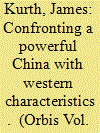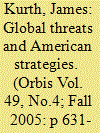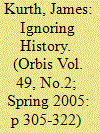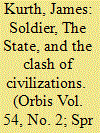|
|
|
Sort Order |
|
|
|
Items / Page
|
|
|
|
|
|
|
| Srl | Item |
| 1 |
ID:
110158


|
|
|
|
|
| Publication |
2012.
|
| Summary/Abstract |
The rapid rise of Chinese economic and military power has produced the most fundamental change in the global system since the end of the Cold War, and it poses vital questions about China's future direction. Many Western analysts argue that China's great power will cause it to become more like the West, i.e., like Western great powers. Other Western analysts believe that China will continue to be the same, i.e., like the China of the past few decades. An alternative interpretation, however, is that China's new power will enable it to become even more Chinese than it is now, i.e., to become more like the traditional and imperial China that existed before the Western intrusions of the 19th century. This China was the "Central State" of a distinctive Chinese world order, operating with distinctive conceptions about diplomatic relations, military strategy, and economic exchange. However, the new China will be unlike the old China in at least two important ways. It will be a naval, and not just a land, power, and it will be a financial, and not just a trading, power. In other words, it will be a powerful China with Western characteristics. As a formidable naval and financial power, China will present fundamental challenges to the United States and to both the long-standing U.S. security order in the Western Pacific and the long-standing "Washington Consensus" about the global economic order.
There was once a great power, one so great that its power not only reached all around the world, but it was recognized as the world's leading power. Its economic practices, political system, and conceptions of international law provided the models and set the standards for numerous other powers. And at the core of its power, and backing up its models, was a special form of military power-the greatest navy in the world-and a special form of economic power, the greatest financial system in the world. That great power was Great Britain, that navy was the Royal Navy, that financial system was centered in the City of London, and that era was just a century ago. However, the greatness of British power had been established almost a century before that, after Britain's victory in the Napoleonic Wars. That victory had largely been won with the advantages provided by the Royal Navy and the Bank of England.
|
|
|
|
|
|
|
|
|
|
|
|
|
|
|
|
| 2 |
ID:
071248


|
|
|
| 3 |
ID:
188150


|
|
|
|
|
| Summary/Abstract |
This essay engages with and revises the author’s article titled, “Fateful Collision: NATO’s Drive to the East versus Russia’s Sphere of Influence,” for the Institute for New Economic Thinking. In addition, it draws on his book, The American Way of Empire: How America Won a World—But Lost Her Way, particularly the chapter on “Europe: NATO Expansion versus the Russian Sphere.”
|
|
|
|
|
|
|
|
|
|
|
|
|
|
|
|
| 4 |
ID:
065230


|
|
|
| 5 |
ID:
067856


|
|
|
| 6 |
ID:
060764


|
|
|
| 7 |
ID:
082278


|
|
|
| 8 |
ID:
155284


|
|
|
|
|
| Summary/Abstract |
The war that began with the terrorist attacks of September 11 has been defined in different ways, and these definitions are meant to have political consequences. President George W. Bush immediately defined the war as one against “terrorists with global reach” and “the states that harbor them.” He was careful not to identify the terrorists with the Islamic religion, for he intended to minimize the number of Muslims who would identify with them. The war was definitely not supposed to be seen as a “clash of civilizations” between Islam and the West. Osama bin Laden, in contrast, repeatedly spoke of a war between “the Islamic nation” and “the Jews and the Crusaders” (or Christians), for he intended to maximize the number of Muslims who would identify with his cause. For him, the war was indeed supposed to be seen as a clash of civilizations between Islam and the West.
|
|
|
|
|
|
|
|
|
|
|
|
|
|
|
|
| 9 |
ID:
058813


|
|
|
| 10 |
ID:
093946


|
|
|
|
|
| Publication |
2010.
|
| Summary/Abstract |
The major military challenge that the United States faces today is the war in Afghanistan. The U.S. military is engaged in a grueling counterinsurgency campaign against the Islamist movement known as the Taliban, which is based among Pashtun tribes in Southeastern Afghanistan and Northwestern Pakistan, who have never been permanently subdued by a foreign military force. This challenge comes in the wake of that other grueling counterinsurgency war that the U.S. military has had to conduct in Iraq, where its chief adversary was the Islamist movement known as al Qaeda in Mesopotamia. Moreover, the challenge in Afghanistan comes on what could be the eve of an impending military challenge, perhaps even a war, with Iran, as that Islamist state relentlessly moves toward acquiring nuclear weapons. In its entire history of two- and-a-quarter centuries, the United States has never been engaged in an unbroken succession of three wars, in three different countries. Together, the U.S. wars with or within Islamist countries add up to what is a "long war," indeed.
|
|
|
|
|
|
|
|
|
|
|
|
|
|
|
|
| 11 |
ID:
105331


|
|
|
| 12 |
ID:
155283


|
|
|
|
|
|
|
|